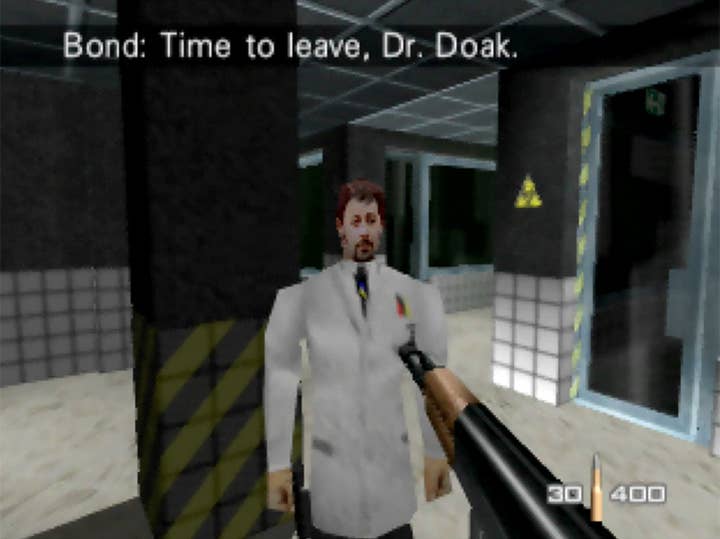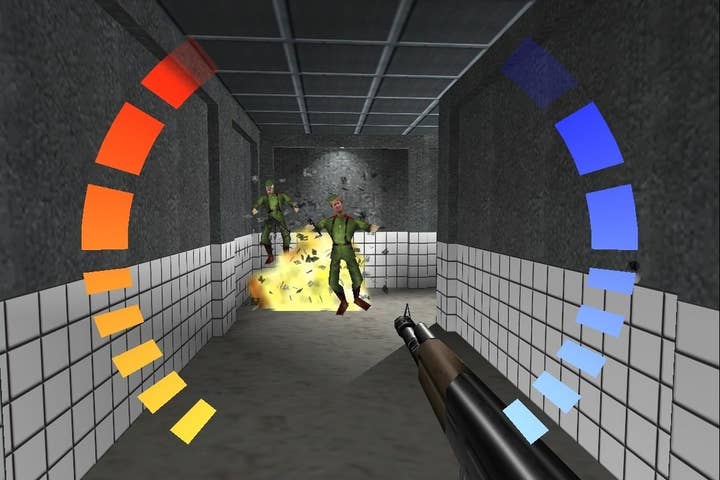What if Goldeneye was made today? | Opinion
Game preservation shouldn't just be about the products, but the stories behind how they were made
I visited Cambridge at the weekend to watch a panel on the making of Goldeneye, which was put on by the Centre for Computing History.
I went with GI's esteemed Editor-In-Chief James Batchelor. We are both Nintendo fans of the late 1990s, so naturally Goldeneye 007 ranks highly as one of the greatest games of all time.
In my admittedly very biased eyes, Goldeneye is one of the last big games of that era begging to be remastered (and people want a remaster, not a reimagining or a completely different game with the same name). It sold around eight million copies on the N64, and it's the console's most popular game outside of Japan. But Goldeneye's reach extended well beyond those eight million players. It was the one N64 game coveted by PlayStation fans, who would visit their N64-owning friends just to play it. It was the Fortnite of the era, if Fortnite was a game that involved four school mates huddled around a small boxy TV.
Of course, the game has been remastered but never officially released. It's stuck in a licensing quagmire due to the number of huge corporations involved (although maybe someone has managed to work it out).
Game preservation is a hot topic right now... but preserving the stories that surround them is just as important
Wishful thinking about remasters aside, James and I went to Cambridge to hear the anecdotes of three of the game's developers: Martin Hollis, David Doak and Brett Jones.
The Goldeneye story has been well told at this point, and the panel broadly covered it. Bond owners MGM approached Nintendo about making a Goldeneye game. Nintendo pushed the opportunity over to UK developer Rare. After a brief visit to the set, Rare decided not to make it, but was convinced to take it on by resident Bond obsessive Martin Hollis.
Hollis formed a team of very inexperienced developers, some fresh out of university and one who didn't even play video games. The project missed its initial deadline by a long way, and if the team had been made to hit it, Goldeneye would likely have been an on-rails shooter without its iconic multiplayer mode. Fortunately, Nintendo and Rare gave the team time (whether out of a desire to get the game right, or indifference, it's hard to say), and a legend was born.
That story has been told many times. But thankfully the panel was also full of interesting little insights into making video games in the late 1990s. Jones told us all about the motion capture machine they had to use, which they wired level designer Duncan Botwood up to. Botwood had to do rolls, falls and was even blind-folded to ensure realistic reactions to being hit. But he had to do it within a confined space, because the wires meant that if he was too elaborate, he'd pull the machine off the wall.
The panel also reminded us, numerous times, that this was the age before the internet. So finding out how actors looked from certain angles, or what the right textures of an Egyptian temple would look like, required a bit of guess work and searching through text books.

One of my favourite stories was how Nintendo of America put plenty of rental copies of the game into Blockbuster, because it knew that even if players completed the single-player during their rental period, they'd still likely return to buy it just to play the multiplayer. And Nintendo was right.
All of those stories are related to a bygone era, where you couldn't Google Roger Moore's face and renting a physical game from a physical shop was a thing people actually did (a lot).
Today, Goldeneye's multiplayer would have daily challenges to complete and Oddjob would have been nerfed in the first patch
In fact, there were several moments where Hollis, Jones and Doak would say "That wouldn't happen today," which got me thinking... what if Goldeneye was made today? What would it be like?
Well, the multiplayer would be online, of course. And the game's cheats (which you can unlock as you go through the game) would most likely be locked behind a mictotransaction pay wall. The recurring revenue would enable the team to make all sorts of additional multiplayer levels, more characters, extra weapons and so on. There would be daily challenges to complete and Oddjob would have been nerfed in the first patch.
The game already has a small competitive scene, so the chances are it'd be an esport, so we ought to expect more advanced spectator modes and broadcast-friendly features.
And most of that would be great to see. I could argue there's something to be said for a multiplayer game that is static and not constantly tweaked and updated. But back in 1999, I bought myself an Action Replay card so I could unearth a multiplayer level that Rare cut from the game. And it also let me visit a secret island in the opening Dam level. Both were rubbish, but I was desperate for more Goldeneye. If the game was released today, I would have got what I wanted.
But the reality is that Goldeneye wouldn't exist if it was made today. Certainly not the game we all fell in love with. There's no way a company as big as Nintendo and a developer as acclaimed as Rare would sign the James Bond licence and give it to a group of inexperienced developers in 2022. The team size would be considerably bigger, and employees would have had defined roles. You certainly wouldn't get the animator running the motion capture, or the dev team shouting in a corridor to create sound effects. And as for adding something as big and complex as a multiplayer mode so late into development? Not a chance.

Goldeneye is a product of its time. Which is why I attend talks like this one. I want to hear about how games used to be made and discover the people who made them. I want to hear how they made wonderful things with limited tech, and how they approached projects with no template to follow.
Game preservation is a hot topic right now, with organisations and companies taking it upon themselves to find, protect, remaster and re-release classic games. But for me, preserving the stories that surround them is just as important.
Not all of the stories are good ones. In fact, a lot of them aren't. Brett Jones told the audience how he added [classic Bond character] Mayday into the game because there were not enough female characters. Meanwhile, Martin Hollis explained how you weren't allowed to listen to music at Rare, but could put some tunes on after 5:30pm: "Which was about halfway through the working day," he quipped.
Right there are the representation and crunch issues that still blight the games industry to this day (although, I hope, not as badly as they did 25 years ago). Chronicling the history of those issues are important to our understanding of why they exist, and how we might be able to fix them.
I am pleased that there are places like the Centre for Computing History enabling these stories to be told. And it's something more people should be playing an active role in recording. One of the notable things at the video game BAFTAs this year was the 'In Memoriam' section, which featured several names from video games who had sadly died over the past year. These moments of remembrance are commonplace in music, TV and film, but games is a young medium, and we aren't used to seeing it.
Video games are 50 years old now. We are reaching a point where their history needs to be recorded or it risks being lost. The founding game creators of this industry are not going to be around forever. So for me, making sure we listen and preserve their stories is as important as playing and preserving the products themselves.

